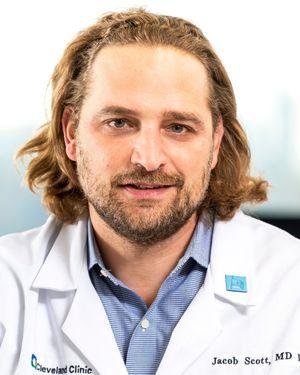Research News
09/20/2021
Cancer Treatment Approach Developed by LRI Researchers Proven Feasible in Clinical Study
Dr. Scott invented a new radiation planning technique called Temporally Feathered Radiation Therapy to reduce toxicity, which has now been shown to be safe and feasible in a small clinical study.

Researchers from Cleveland Clinic and OhioHealth have published results from a first-in-human trial evaluating the feasibility of Temporally Feathered Radiation Therapy (TFRT), which is designed to reduce the toxicity of radiation treatment.
The findings, published in Radiotherapy & Oncology, demonstrate TFRT’s feasibility in clinical workflow. Additionally, assessments of treatment toxicities and radiation dosage comparisons to a standard radiotherapy plan were described.
Temporally Feathered Radiation Therapy is a novel technique to plan and optimize radiotherapy that considers the nonlinear aspects of normal tissue repair to better manage toxicity. The technique is designed to reduce radiation-induced toxicities by optimizing the time through which radiation is delivered, and consequently improves normal tissue recovery. Radiation-induced toxicity is a major contributor to patients' quality of life and often a dose-limiting factor in treating cancer with radiation therapy.
“We are excited that the complex TFRT technique, which uses current planning systems, was able to be delivered safely and in a standard clinical workflow,” said TFRT’s inventor Jacob Scott, MD, DPhil, a practicing radiation oncologist in Taussig Cancer Institute and researcher in the Department of Translational Hematology & Oncology Research. “A larger trial with toxicity as the primary endpoint will allow us to truly study the efficacy of the approach. Collaboration will be important as we work to integrate TFRT into planning systems to expand automation and wider adoption into clinical practice.”
Study details
In this study, five patients with head and neck squamous cell carcinoma were treated with TFRT. The primary endpoint was feasibility of TFRT planning as defined by radiation start within 15 days of treatment planning. Secondary endpoints included estimates of toxicity.
The primary endpoint was met when patients were successfully treated with TFRT techniques without causing delays in radiation commencement. For patients who received TFRT, the median time from treatment planning to radiation start was 10 business days, which is within standard timelines. The average time required for radiation planning was six days. There were no significant deviations from standard planning and toxicity was no more than expected, but Dr. Scott and his team expect a larger trial to show reductions in toxicity without affecting cure rates.
“Radiation oncologists and physicists have made amazing advances in shaping the radiation dose to organs and tissue near a patient’s tumors, leading to effective treatments with less toxicity,” added Shireen Parsai, MD, a radiation oncologist at OhioHealth who led this research during her residency at Cleveland Clinic. “TFRT takes advantage of the differential repair of tumors versus healthy tissue by modulating how the dose is delivered to nearby tissue over time. This approach gives normal tissue more time to heal, allowing us, in theory, to deliver the same curative doses of radiation with less detriment to the patient’s quality of life.”
Featured Experts
News Category
Related News
Research areas
Want To Support Ground-Breaking Research at Cleveland Clinic?
Discover how you can help Cleveland Clinic save lives and continue to lead the transformation of healthcare.
Give to Cleveland Clinic